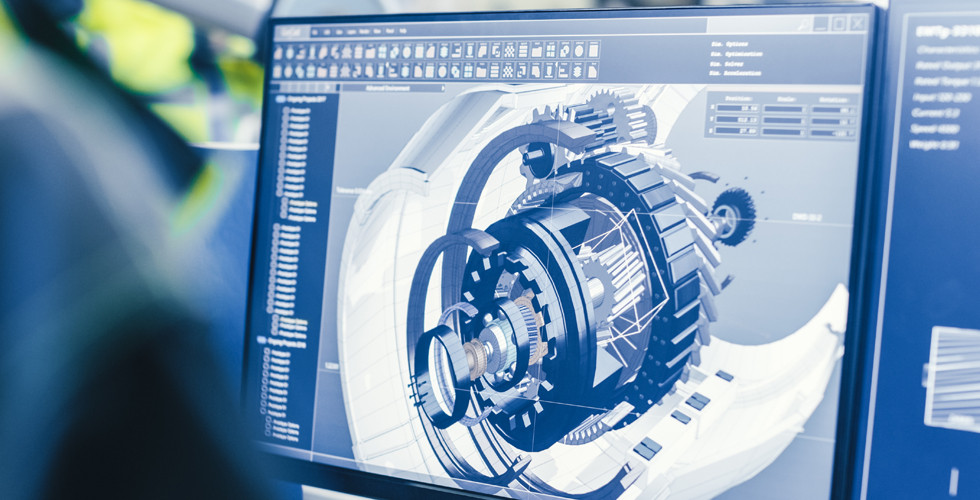Machinery
》 Software
》 Electronics
》 Machinery
Job summary of mechanical engineers
Mechanical engineers design the mechanisms of machines with moving parts using 2D/3D CAD tools.
Design areas include Drive Systems (development of mechanisms for generating, converting, storing, and transmitting energy), Mechanisms (development of mechanisms for production facilities and equipment), and Structures and Materials (design of products in various formats, formulation of structures and housings, and development of new materials).
To perform our engineering work, knowledge of the four major dynamics (dynamics of machinery, strength of materials, fluid dynamics, and thermodynamics) is required.

》 Corresponding jobs and necessary skills
》 Track record
》 Basic training
》 Customized training (practical training)
》 In-house training facilities
Corresponding jobs and necessary skills for mechanical engineers
Drive systems
Corresponding jobs
•Engineers involved in the structural design of fuel cell units, as well as any ancillary work
•Engineers involved in the structural development of fuel cells/EVs, as well as any ancillary work
•Engineers involved in the structural development of powertrains, transmissions, etc., as well as any ancillary work
•Engineers involved in the structural design and development of various motors, as well as any ancillary work
Necessary skills
•In addition to knowledge of mechanical design, basic electrical knowledge is necessary for the development of fuel cells. In addition, knowledge of metal materials (magnetic and non-magnetic) and resin materials is necessary.
•Knowledge of shaping various parts is necessary for the structural development of fuel cells/EVs. In particular, knowledge of thermodynamics and thermal/fluid analysis is necessary if peripheral part development for fuel cells is involved.
•Comprehension of the structures of various parts is necessary for the structural development of powertrains, transmissions, etc. Knowledge of structural design is particularly important, and knowledge of strength of materials and stress analysis is necessary.
•In addition to knowledge of mechanical design, basic electrical knowledge and knowledge of metal materials (magnetic and non-magnetic) are necessary for the structural design and development of motors. In addition, since motors generate noise and vibrations when driven, knowledge concerning noise and vibrations is necessary.
Mechanisms
Corresponding jobs
•Engineers involved in the development of production equipment and devices, such as semiconductor manufacturing equipment and etching systems
•Engineers involved in the development of robots, mechatronic equipment, and pneumatic equipment
•Engineers involved in the design of mechanisms for scientific equipment, printers, inspection equipment, etc.
•Engineers involved in the development of production technologies and methods for production lines, and process management thereof
•Engineers involved in the development of manufacturing equipment and jigs for manufacturing
Necessary skills
•Since many parts that comprise mechanisms have relatively complex shapes, the ability to create drawings that incorporate surface qualities, geometric tolerances, welded structures, etc., is necessary. In addition, knowledge concerning mechanical materials (mainly iron and steel) that comprise devices is indispensable.
•Knowledge of the mechanical components that comprise devices and mechanisms, mechanical components for transmission, hydraulic and pneumatic equipment, instrumentation parts, and control equipment is necessary.
•Since design calculations, such as those for part curvatures and inertial forces, are essential, basic knowledge of strength of materials and dynamics of machinery is necessary.
•Since opportunities to observe assemblies and device installations will arise if promoted to senior positions, basic knowledge of the key points of assembly and adjustment is necessary.
Structures and materials
Corresponding jobs
•Engineers involved in shape design for design-based products, such as non-driving parts (bodies, exteriors, interiors, and harnesses) for transportation equipment and enclosures for medical devices, home appliances, aircraft, etc.
•Engineers involved in the development of new materials, such as electrode and metal materials
•Engineers involved in the development of mass production processes, such as resin molding and casting
Necessary skills
•Since it is necessary to design transportation equipment and home appliances, which fall under the scope of work, under the assumption that they will be mass-produced, the ability to create drawings that incorporate knowledge concerning processing methods is necessary. In addition, since strength is required across a wide range of environments from low to high temperatures, basic knowledge of strength of materials, thermodynamics, fluid dynamics, etc., is necessary.
•Since mastery of various materials, such as resin, metal, and polymer materials, is necessary to fulfill product functionalities, knowledge concerning materials is necessary.
•Since processing large amounts of numerical data, such as material combinations and verification results, is required for the development of new materials, basic knowledge concerning data processing is necessary.
Track record of mechanical engineers
Artner’s mechanical engineers have a proven track record in a wide variety of projects in the core areas of manufacturers’ business processes.
Training programs and in-house training facilities for mechanical engineers
At our extensive in-house training facilities, new mechanical engineers receive two levels of specialized training: basic training and customized training (practical training).
Basic training
The trainees will be retrained from scratch, reviewing what they learned in school.
This practical training curriculum involves focusing on how to apply the knowledge learned in school to actual development work.
》 Curriculum details
Customized training (practical training)
This training focuses on specific client company operations to provide process-based education that matches the needs of each workplace. The trainees will acquire a wide range of necessary technical skills, from basic to application.
》 Curriculum details

